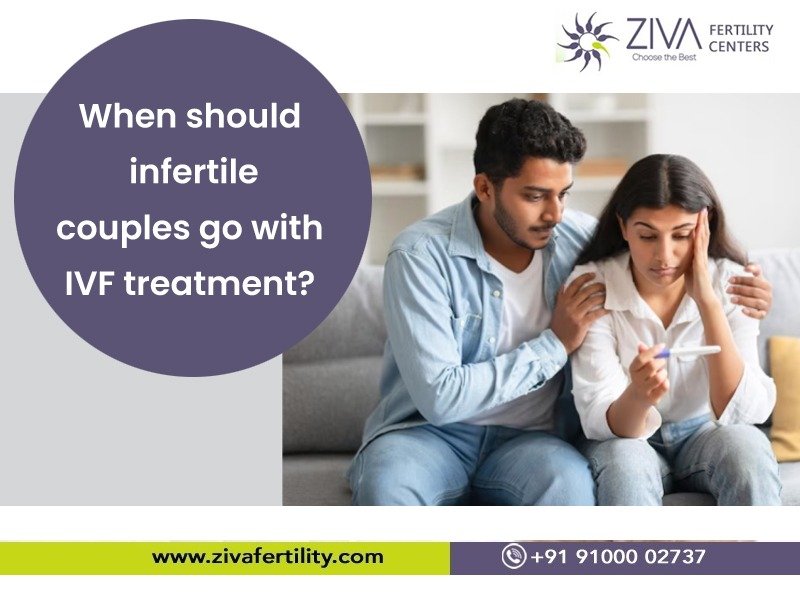Most couples who realize their infertility usually make in vitro fertilization (IVF) “the last stop.” That said, people don’t realize that IVF can be the first and most successful option. It works for a broad range of people, like couples for whom traditional conception and pregnancy aren’t an option – like women with infertility diagnoses that make it impossible for natural fertilization via non-assisted methods.
When should infertile couples go with IVF treatment?
IVF works even if other infertility treatments have failed: Most couples move through a range of fertility treatments before deciding to opt for IVF. They try various options such as surgery, fertility medications, intrauterine insemination, and so on. In some of the infertility conditions, the doctor will recommend IVF from the get-go so you don’t waste your time and money on other fertility treatments. Couples suffering from blocked fallopian tubes, severe male infertility factor, reduced ovarian reserves, and advanced maternal age, i.e., when the female partner is over the age of 38. Other conditions include:
Fallopian tube damage or blockage: Through the fallopian tubes, eggs move from the ovaries to the uterus, so if both tubes get damaged or blocked, fertilization becomes hard, or an embryo cannot travel back to the uterus.
Ovulation disorders: Without ovulation, fertilization by sperm cannot happen.
Endometriosis: In women, the uterine inner lining-like tissue grows outside the uterus on organs such as the ovaries, uterus, and fallopian tubes. This causes issues with ovulation, fertilization, and implantation.
Uterine fibroids: Fibroids are tumours in the uterus and are mostly non-cancerous. Women in their 30s and 40s usually have fibroids. They can cause issues for the fertilized egg to attach to the lining of the uterus.
Previous surgeries: Any surgery where both the fallopian tubes were cut or blocked, then IVF may help if you want to have kids again.
Male Infertility issues with sperm: If the male partner’s sperm has problems such as a low number of sperm or unusual changes in their movement, size, or shape, then fertilization is an issue with such sperm.
Unexplained infertility: Despite all the testing on both partners, the cause of someone’s infertility could still not be determined.
Cancer treatments: If a person is undergoing cancer treatment, then they can freeze their eggs so that they can be used in IVF later on for a successful pregnancy.
Works in all cases: In-vitro fertilization need not be for married couples only but can also be used by surrogates or gestational carriers, so a range of people can give birth to a child with IVF. Such cases include women who cannot physically carry a baby full-term, or single women, to name a few. IVF works also for instances of donor eggs and sperm. When donor egg or sperm are used, the egg can be manually fertilized in the clinic, and a resulting, viable embryo can be used for IVF, which increases your chances of getting pregnant.
Couples can delay their pregnancies: nowadays, most couples want to settle financially before they decide to start a family. Those focused on their careers or have life circumstances due to which they have to delay pregnancies will find that IVF benefits them by giving them more overall control. Eggs or embryos can be frozen and can be transplanted at their desired time.
Protection against genetic disorders: Genetic screening helps to ensure your baby is born healthy, so tests called preimplantation genetic testing (PGT) are done to ensure the fetuses used during IVF are free of known genetic markers. These tests can determine the chances of the offspring getting life-threatening medical conditions such as cystic fibrosis, down syndrome, sickle cell anaemia, and Tay-Sachs disease. These tests are conducted only if the mother and father have either of these diseases or if there is a family history of serious genetically linked diseases.
Reduced risk of a miscarriage: Genetic abnormality is the most common cause of miscarriage, so by performing PGT, mothers have a better chance of enjoying a healthy pregnancy and carrying the baby full-term.
Increase your chances of conception: IVF with PGT has proven to achieve success rates as compared to other assisted reproductive options. IVF cycles can be repeated to increase a woman’s chances of fertilization, a healthy pregnancy and live birth.
We have helped a lot of couples realize their dream of a baby. We have experience with all types of reasons for choosing an IVF. For more information, please visit our website https://zivafertility.com/ or contact us at +91-9100002737 or +91-9347406900
















